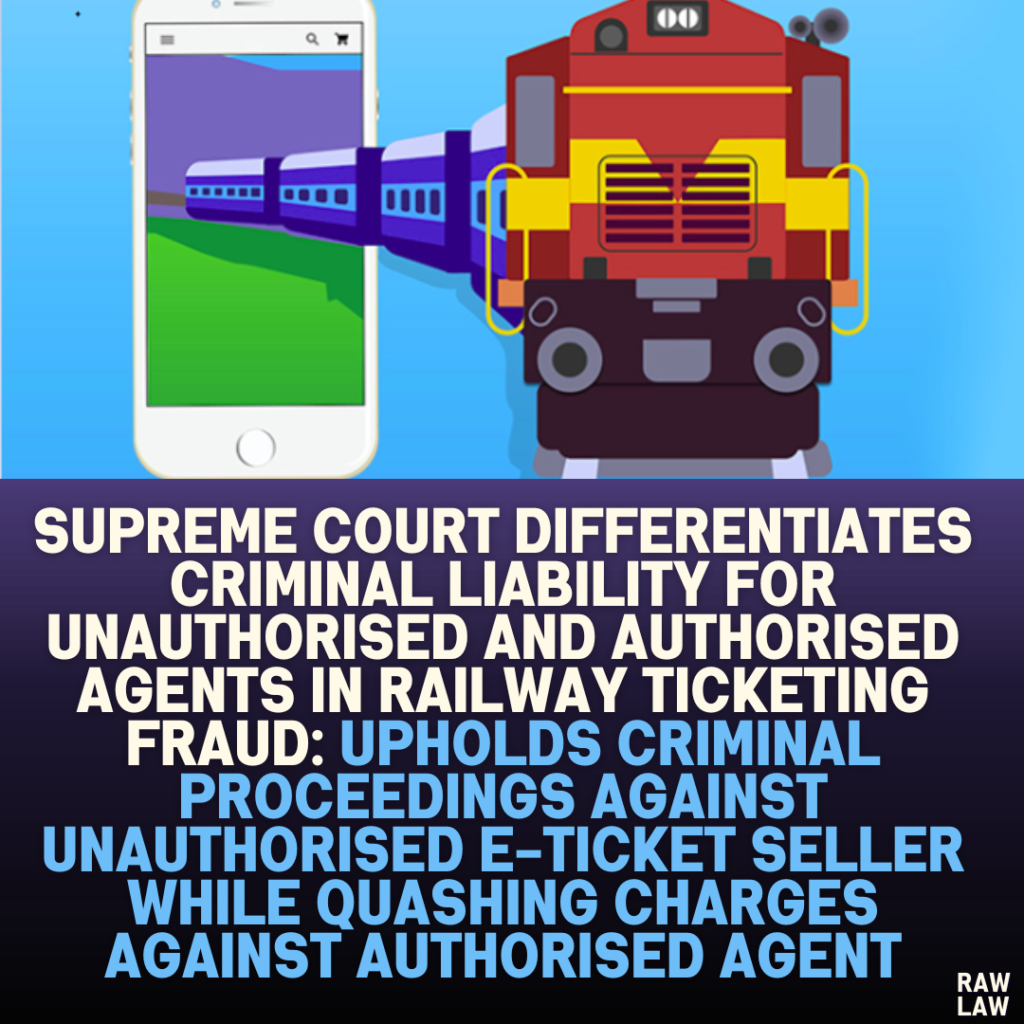Court’s Decision
The Supreme Court resolved appeals concerning the unauthorised and fraudulent sale of railway tickets under Section 143 of the Railways Act, 1989. The Court restored criminal proceedings against Mathew, an unauthorised individual, for operating an illegal ticketing business. Conversely, it quashed proceedings against Ramesh, an authorised agent, ruling that his alleged misuse of multiple user IDs does not attract criminal liability under Section 143 but may warrant civil action.
Facts
- Case Against Mathew:
- Mathew, a managing director of a non-banking financial company, was accused of creating hundreds of fraudulent user IDs on the IRCTC platform to procure and sell railway tickets at a premium.
- Following a search and seizure operation, evidence was recovered, and Mathew was charged under Section 143(1)(a) for unauthorised procurement and supply of tickets.
- The Kerala High Court quashed the criminal proceedings, arguing that the Act, predating e-ticketing, could not criminalise such actions.
- Case Against Ramesh:
- Ramesh, an authorised agent, was accused of using multiple personal user IDs to issue Tatkal and other e-tickets for commercial gain.
- Despite being an authorised agent, the Madras High Court refused to quash the proceedings, citing illegal profiteering and a breach of IRCTC rules.
Issues
- Does Section 143 apply to unauthorised online ticketing operations, even though e-ticketing was not envisioned when the Railways Act was enacted?
- Can an authorised agent face criminal liability under Section 143 for allegedly unauthorised actions like creating multiple user IDs?
Petitioner’s Arguments
- Against Mathew:
- Section 143 prohibits unauthorised procurement and supply of railway tickets, irrespective of the mode (physical or digital).
- Mathew’s fraudulent actions violate the statute as he lacked authorisation and defrauded genuine passengers.
- Against Ramesh:
- Ramesh’s actions, though under the guise of authorisation, breached IRCTC’s rules and involved financial exploitation, falling within the ambit of Section 143.
Respondent’s Arguments
- Section 143, being a penal provision, must be construed narrowly. It does not criminalise actions like creating multiple user IDs, especially when the individual is an authorised agent.
- For Ramesh, any breach of terms should be addressed via civil remedies rather than invoking criminal provisions.
Analysis of the Law
The Court conducted a detailed examination of Section 143:
- Scope of Section 143:
- Section 143 penalises the unauthorised business of procuring and supplying railway tickets, explicitly excluding railway servants and authorised agents.
- The provision does not distinguish between physical tickets and e-tickets, making it technology-neutral.
- The language of Section 143 is broad enough to encompass online ticketing, as the fundamental objective is to prevent fraud and unauthorised activities.
- Applicability to E-Ticketing:
- The Court highlighted that the law must adapt to changing societal and technological contexts.
- Referencing Senior Electric Inspector v. Laxminarayan Chopra and Dharani Sugars and Chemicals Ltd., the Court stated that statutory provisions can apply to new circumstances if the language supports such interpretation.
- Literal Interpretation of Penal Laws:
- Penal provisions must be interpreted strictly. Section 143 explicitly targets unauthorised agents and does not criminalise the unauthorised acts of authorised agents.
- Thus, actions like creating multiple user IDs by Ramesh, though breaching IRCTC guidelines, do not attract criminal liability under Section 143.
Precedent Analysis
The Court relied on several rulings to establish interpretative principles:
- Senior Electric Inspector v. Laxminarayan Chopra: Statutory language can extend to unforeseen developments.
- Jugalkishore Saraf v. Raw Cotton Co. Ltd.: Penal provisions should be read literally unless absurdity arises.
- State of Haryana v. Bhajan Lal: Laid down grounds for quashing criminal proceedings, including the absence of prima facie evidence.
Court’s Reasoning
- Against Mathew:
- Mathew’s unauthorised actions fell squarely within the ambit of Section 143. The provision explicitly prohibits individuals without railway authorisation from procuring and supplying tickets.
- The Kerala High Court erred in reading down the provision on the basis that it predated e-ticketing.
- Against Ramesh:
- Ramesh, being an authorised agent, was exempt from Section 143. His alleged misuse of IRCTC’s rules should be addressed through civil proceedings, as the provision does not criminalise such actions.
Conclusion
- The Court restored criminal proceedings against Mathew, allowing the trial to proceed and emphasising the societal impact of unauthorised railway ticketing.
- It quashed the proceedings against Ramesh, holding that contractual breaches by authorised agents fall outside the purview of Section 143.
Implications
- The judgment affirms the adaptability of statutory provisions to technological advancements, reinforcing that laws can address novel challenges without explicit amendments.
- It delineates the boundary between criminal and civil liabilities, ensuring that penal provisions are not misapplied to contractual disputes.
This detailed breakdown highlights the Court’s nuanced reasoning and its balanced approach to interpreting penal provisions and modern technological contexts.




Pingback: High Court of Delhi Enhances Compensation for Road Accident Victim: "Exhaustion of Medical Leave Must Be Compensated," Increases Award to ₹1,50,580 with 9% Interest Under Motor Vehicles Act - Raw Law